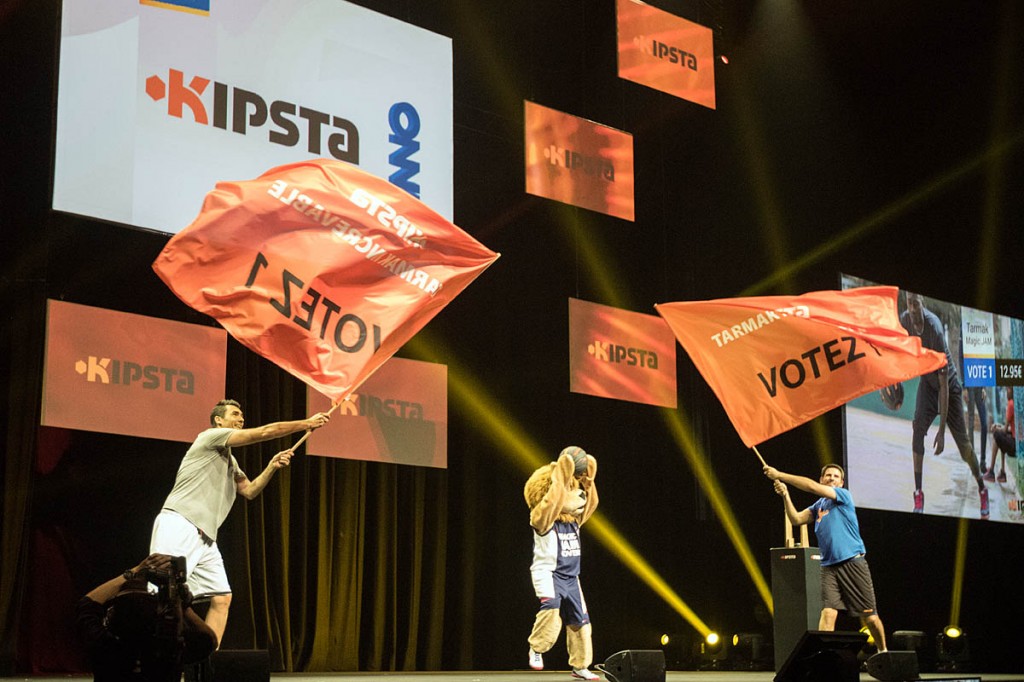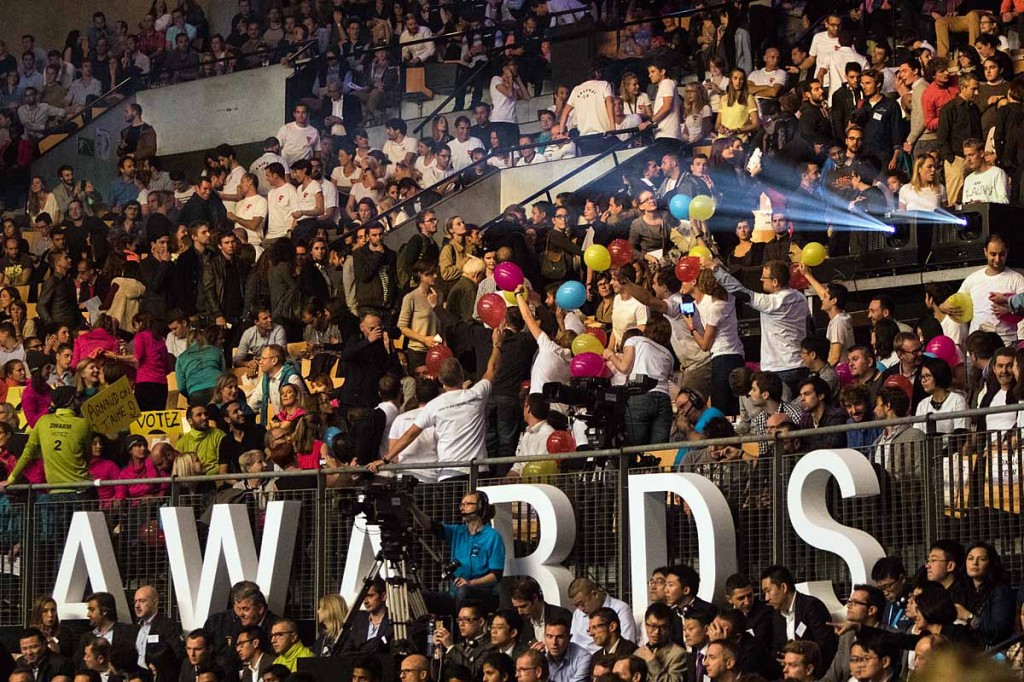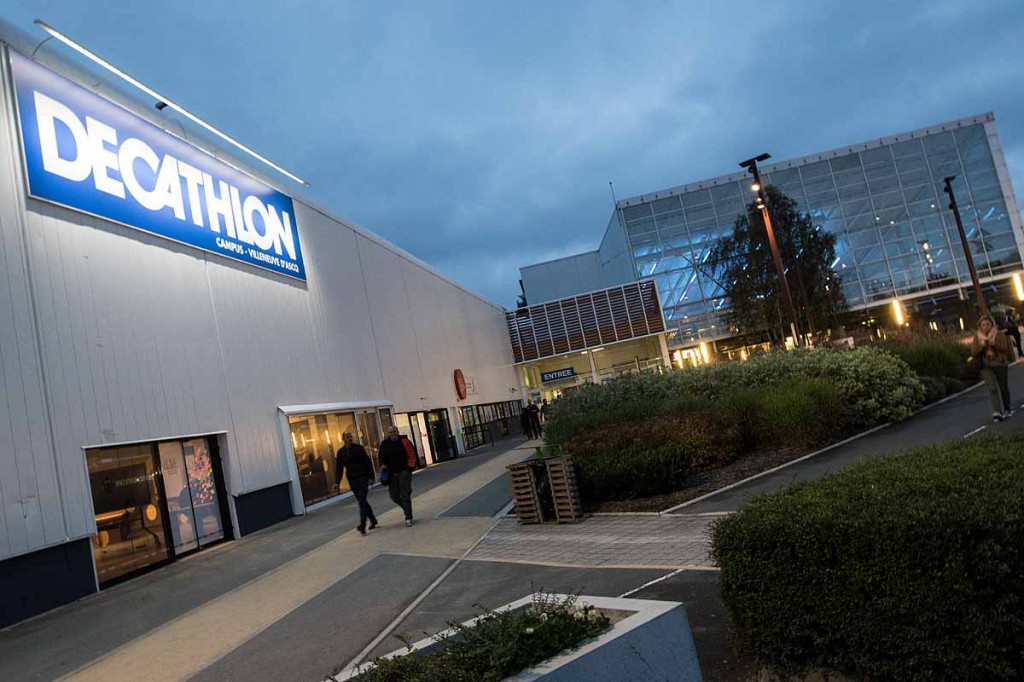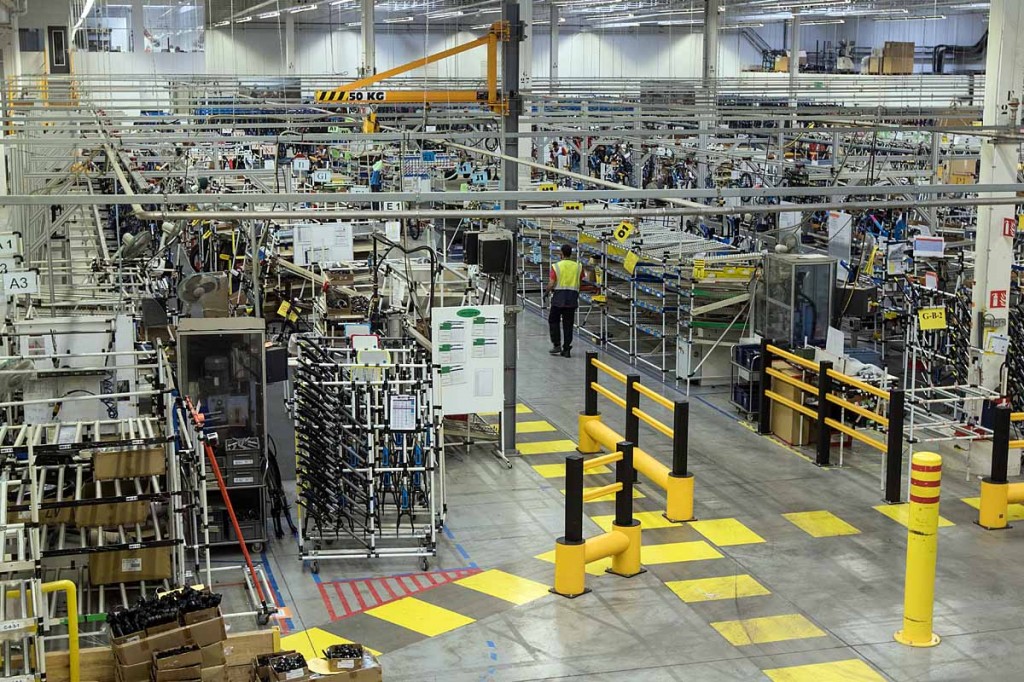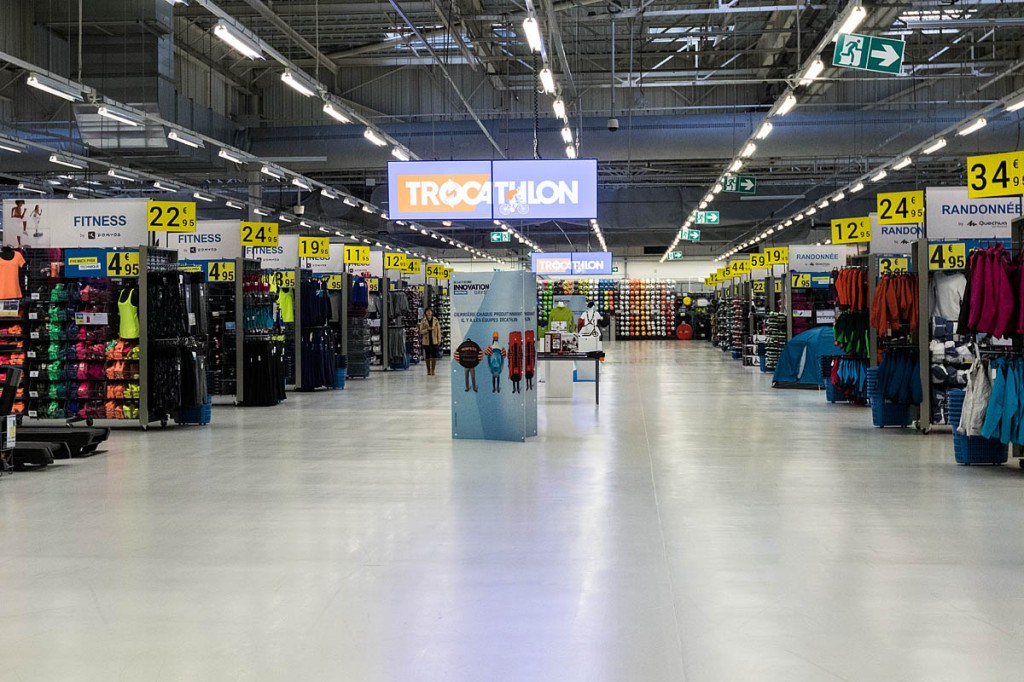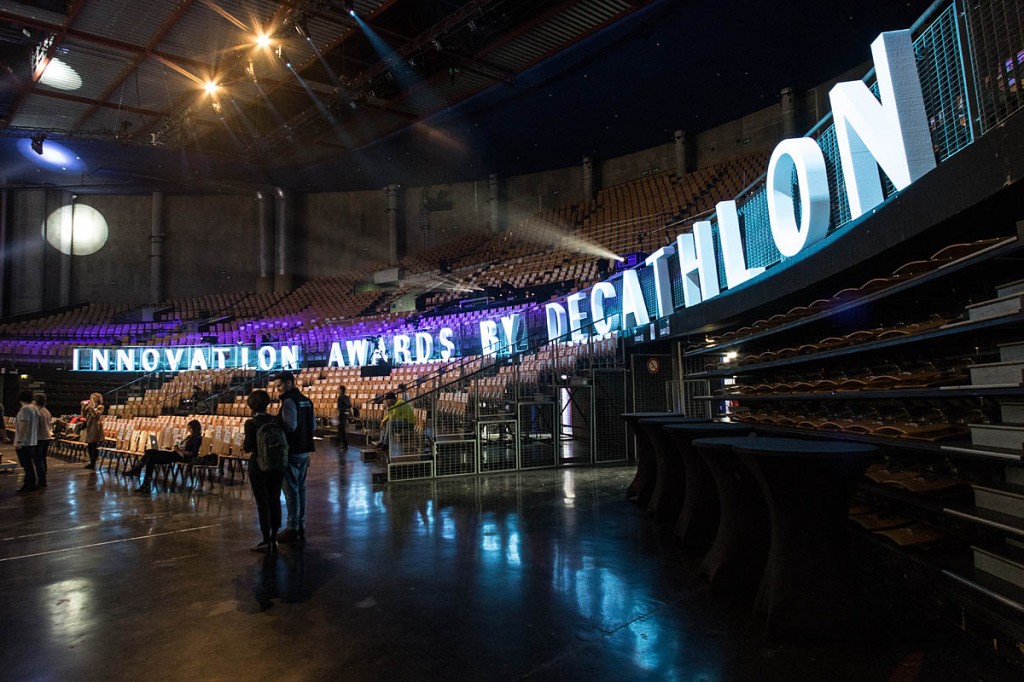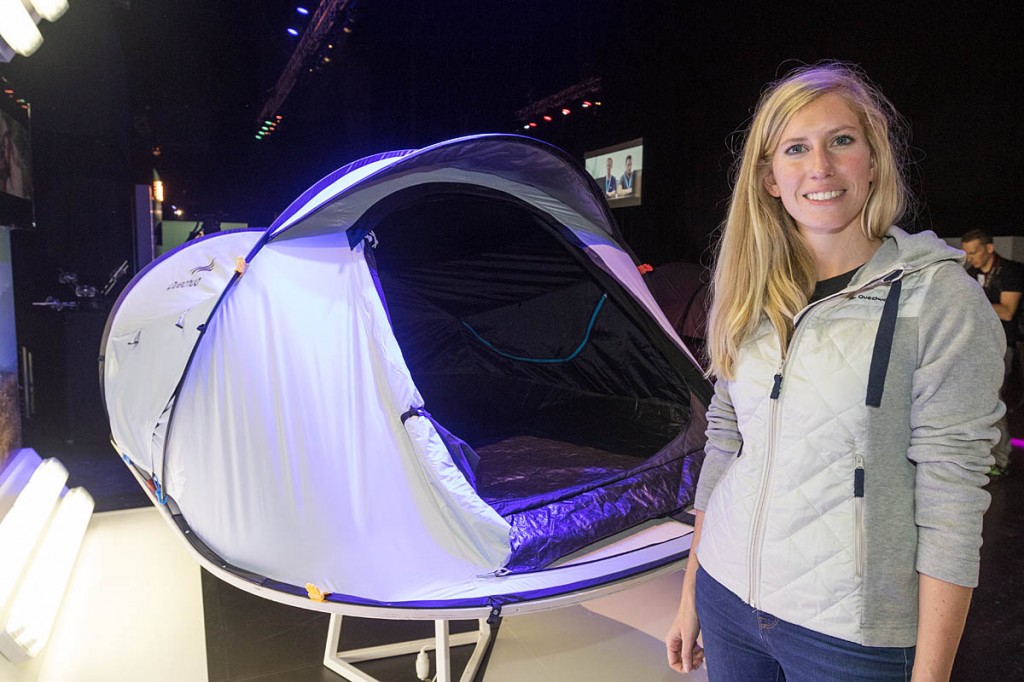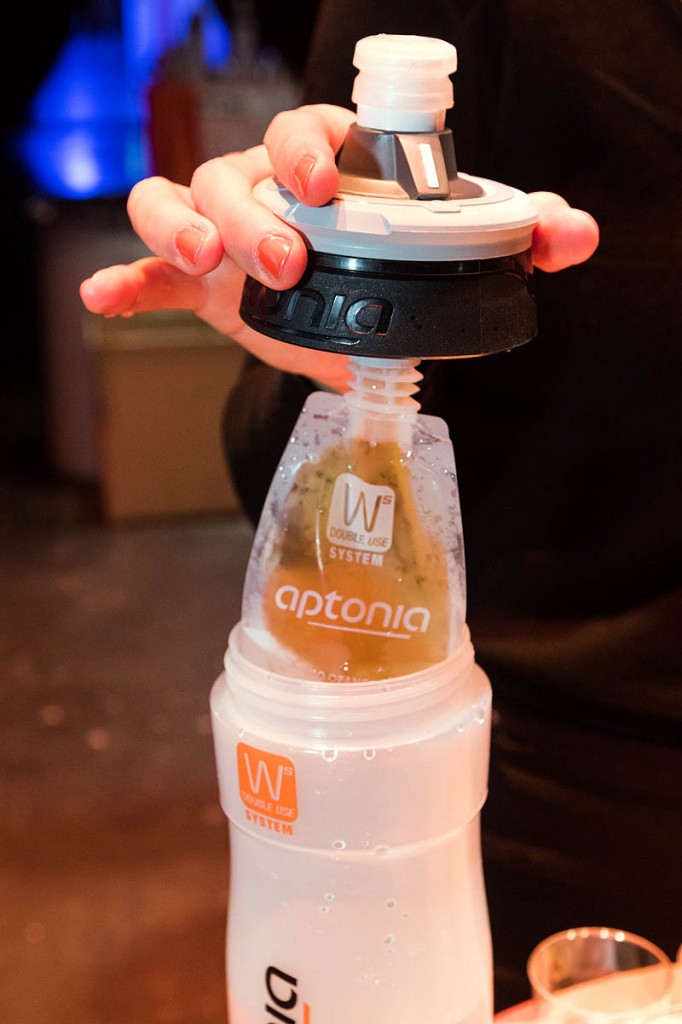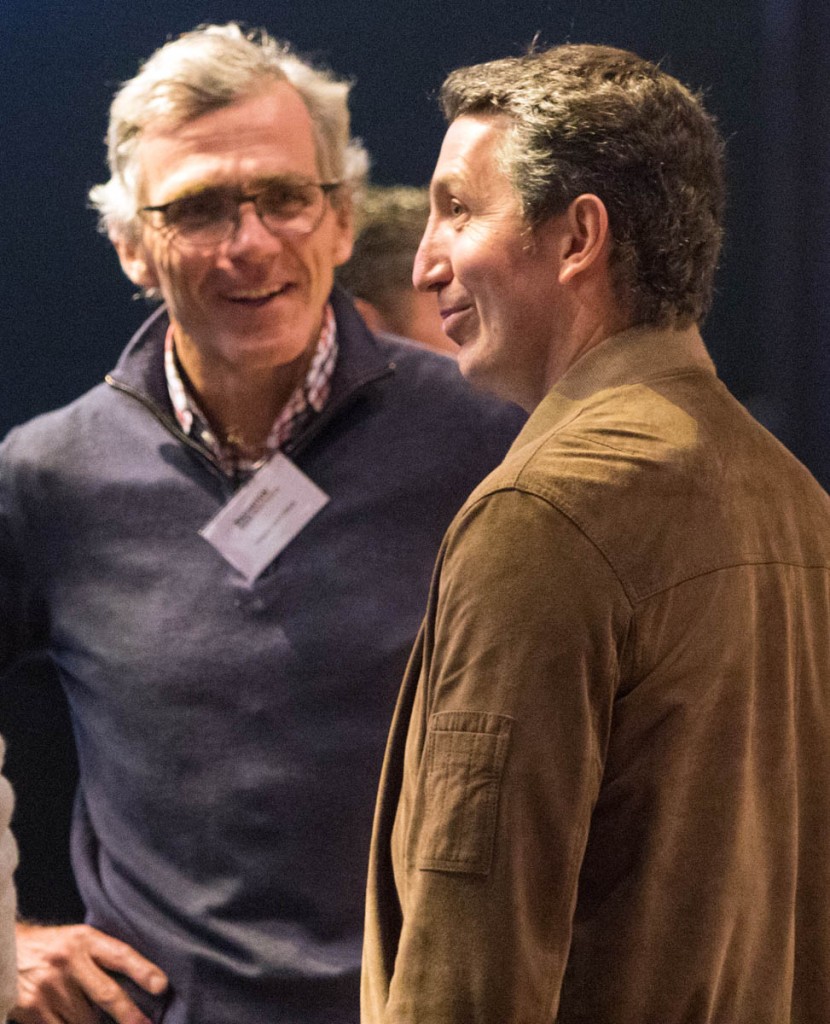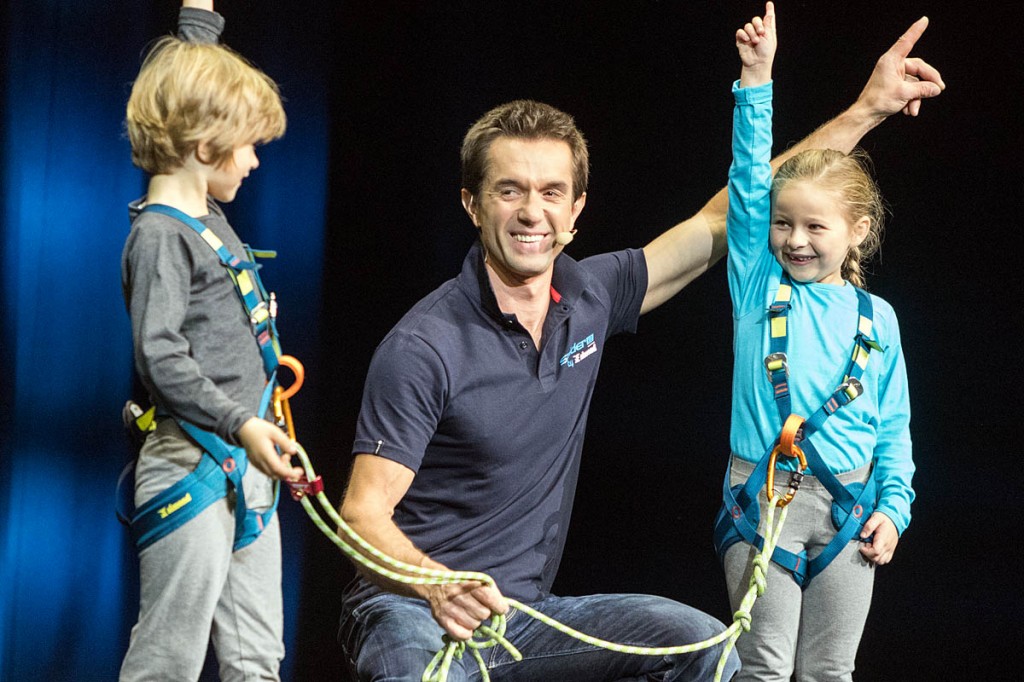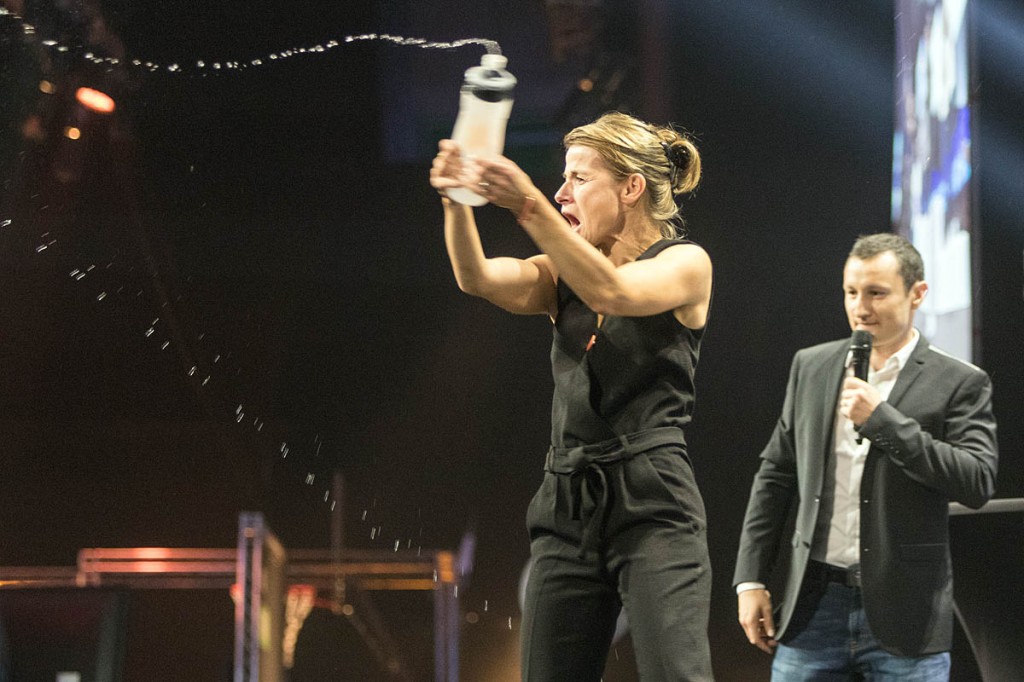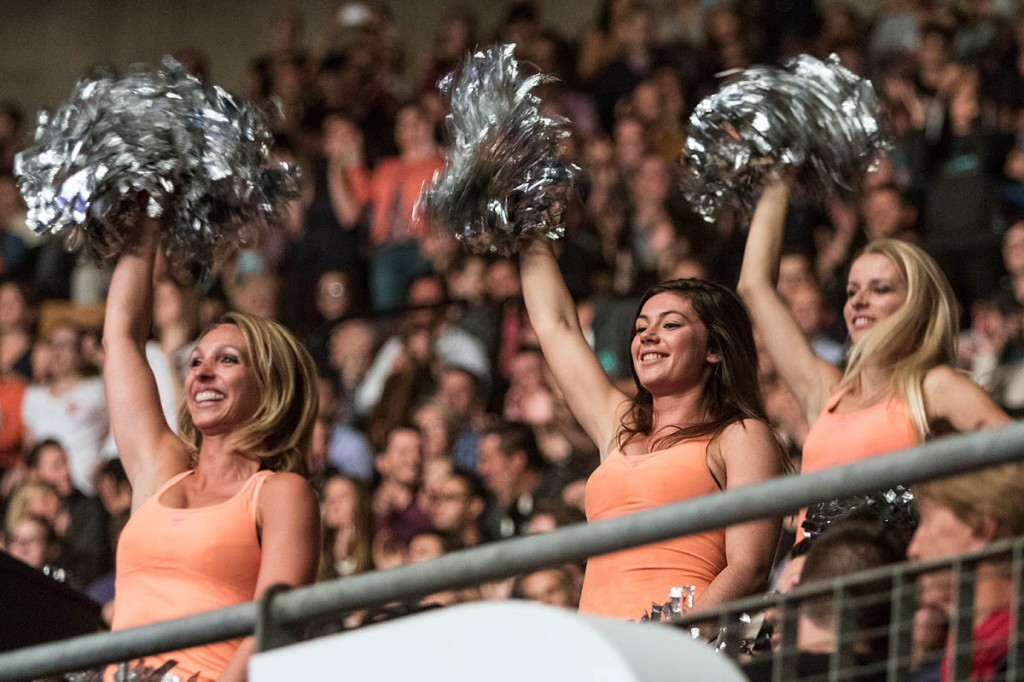A few metres in front of me, someone in a lion outfit punctures a basketball on a spike; then a man dressed as a magician swirls his cloak to reveal a drinks bottle. Behind me, a deafening chorus of vuvuzelas and plastic hand clappers accompanies young women in cheerleader outfits energetically waving their pompoms.
Welcome to the surreal world of the Decathlon Innovation Awards.
In the brutalist, cavernous Zénith centre in Lille, northern France, 3,600 staff, managers, customers and journalists are gathered to see the top 10 innovations from the teams that create products for the brands of one of the world’s biggest sports retailers.
There is fierce competition between the workers’ teams on each brand. The winner will be chosen by a vote, not just of those in the hall, but across the globe as the awards are streamed online to anyone who wants to watch.
In the interests of journalistic integrity, I didn’t vote, but I did harbour a secret wish that the brands that produce goods for the outdoor enthusiast would do well, rather than those that concentrate on team sports such as football and basketball or those that deal with golf or fishing.
Before the French company invited me to this annual celebration of corporate inventiveness, I had little knowledge of Decathlon. Founded in France’s fifth largest conurbation in 1976, the first Lille store stocked goods for 10 different sports, hence the name.
Now, it has 65,000 employees in 22 countries across the globe, and last year had a turnover of €8.2bn (£6.1bn). It is a truly international operation, with 73 nationalities represented among its staff. Its first UK store, Surrey Quays in London’s Docklands, opened in 1999; it plans to open its 20th UK superstore, on Tyneside, in December this year.
In the UK, about a third of its sales come from its mountain sports brand Quechua. It is also a strong presence in the cycling market with its b’Twin brand – pronounced as between – though this isn’t represented at this year’s awards.
Simond, the only brand Decathlon bought rather than founded, produces climbing gear, while Wed’ze deals with Snowsports and Kalenji running.
Other brands sell goods for sports as diverse as fishing, dance, swimming and urban skating.
For an insight into Decathlon’s production, the company took a group of journalists to its factory and adjacent megastore at the giant b’Twin Village near the centre of Lille. Once the buildings for an aerodrome, then a cigarette factory, the complex now produces healthier goods.
Each year, its workers assemble 170,000 bikes and, when things are working well, one standard bike comes off the assembly line each minute. It’s also where the brand’s high-end bikes are put together for its global retail network. These are produced on demand.
Prices for b’Twin cycles range from €99 to €7,000
The factory’s 170 staff rotate through three different workstations each day to reduce monotony and repetition.
Human resources manager Joffrey Catteau explains new employees are trained in five different tasks on an assembly line, of which there are three.
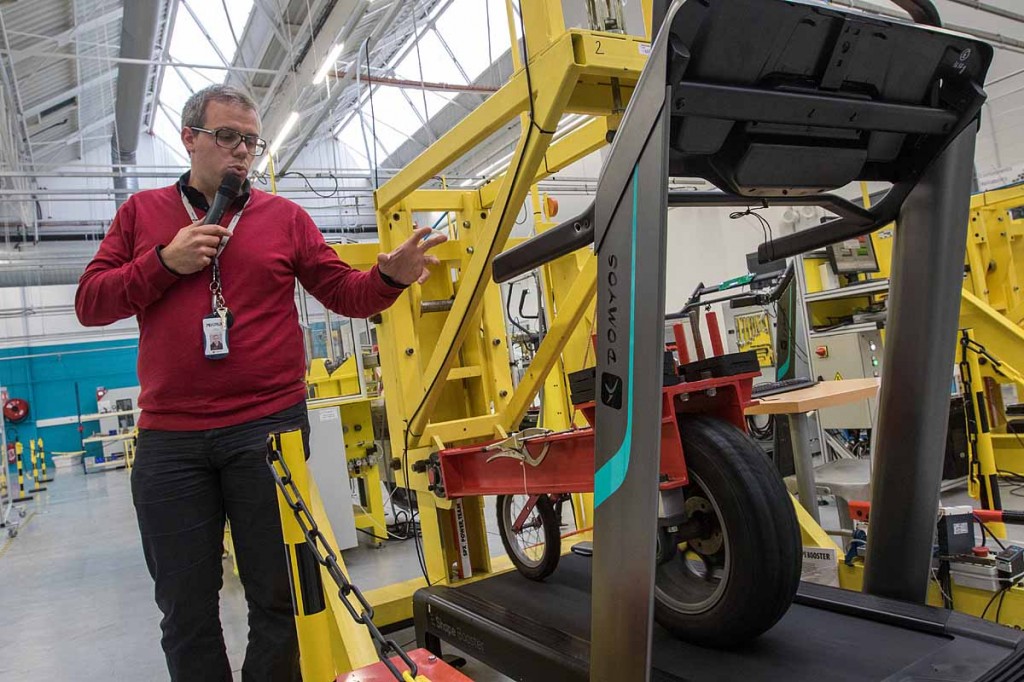
One of the b'Twin products is tested, on a treadmill produced by one of Decathlon's other brands Domyos
Outside the factory, youngsters are using the b’Twin Village’s BMX track. Into the adjacent shop, and two men are using the store’s do-it-yourself maintenance area. Children are whizzing round a fenced-off indoor track, and a customer is trying out a couple of bikes on the store’s marked interior cycleway before she makes her choice.
We’re then shown the b’Twin design area, where prototypes are developed and models tested. A bike on a treadmill is subjected to 1,000 hours of running. Other departments put frames through a stress test. In total, the b’Twin laboratories perform 11,000 tests on bikes and components worldwide each year.
A short drive away lies the Decathlon Campus, a combination of the firm’s design headquarters and a megastore. This huge 22ha (54-acre) site is the workplace of 2,000 people.
As the press gathers for a series of short talks, in the corner of the room employees are involved in a workshop to design a new child seat for the b’Twin brand.
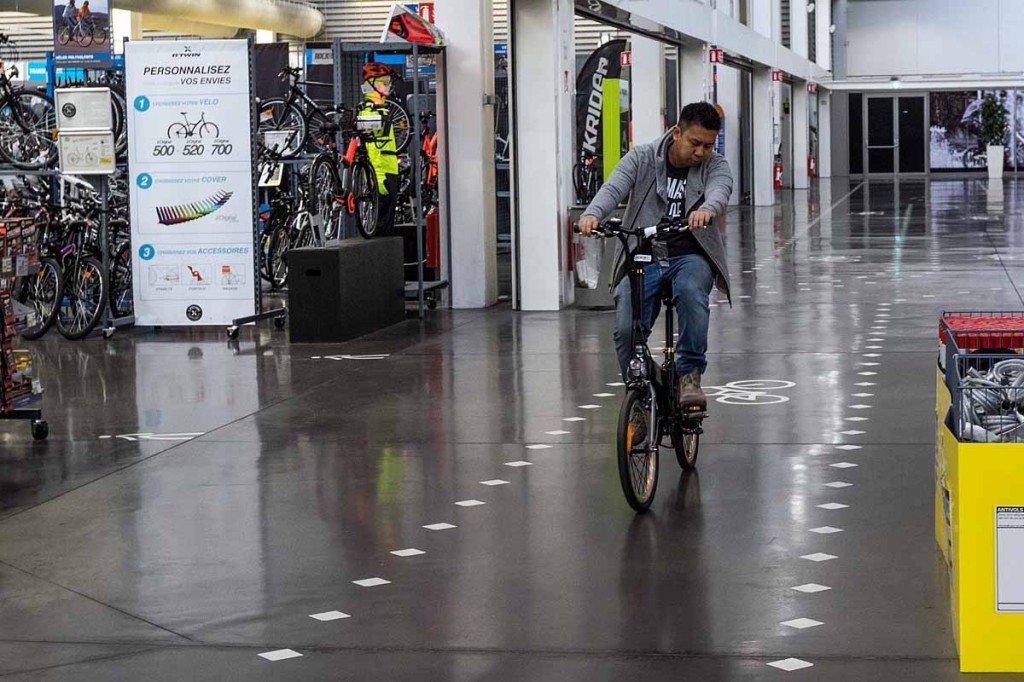
The b'Twin Village store has cycle lanes in it for customers to try before they buy, in this case an electric bike
There are football pitches and basketball courts at the Campus, but it is also home to the Sports Lab and research and development departments. The labs deal with the initial idea, through conception to prototype, production with testing and then examination.
In the labs, a rucksack is being raised by its haul loop and dropped 10,000 times to test its durability. Elsewhere, a trolley bag is being submitted to 20km of dragging and a robotic football machine fires a ball at a concrete wall.
The Decathlon campus also has a morphology lab. Research has shown that Asian and European heads, though roughly the same circumference, are different shapes, so headwear and helmets have to be adapted accordingly for different markets.
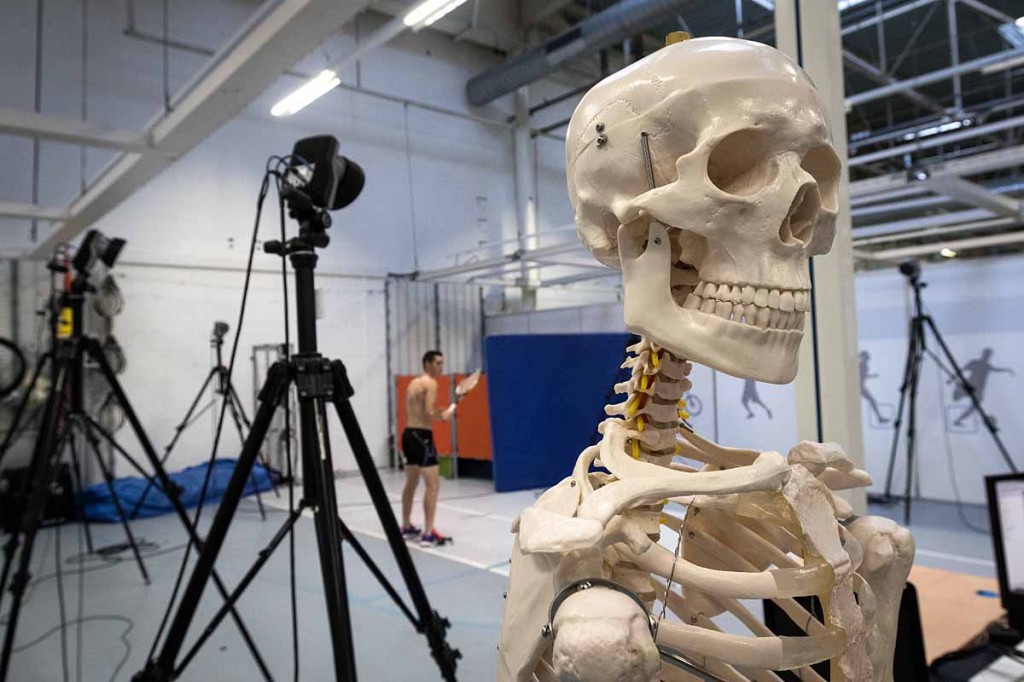
Smile for the camera: a volunteer employee produces an animation for tennis moves in the Campus labs
Next door, a volunteer employee is stripped to the waist and has probes attached to his body to enable live action animation to be captured by cameras for research into tennis actions.
We step through a security door and into the megastore next door, all 10,000 sq m-worth. The aisles are wide, with lots of space for children to play with the gear set out. It seems a visit to the Decathlon store is a favourite pastime for many French families, especially when the kids have the afternoon off for their weekly half-day.
Next stop on our whirlwind tour of Decathlon’s empire is a visit to the newly opened Kip Stadium in the northern suburb of Tourcoing. It’s a run-down industrial area and the sports company has transformed a redundant bus garage and brewery into both a store and a sports facility for the local community. There are indoor sports area and outdoor football pitches. There’s even a beach for beach volleyball.
It’s of less interest to me as an outdoor pursuits enthusiast, but there’s no denying the continuing quest for innovation as I watch a woman put up a full-size portable basketball set-up in less than two minutes.
It’s time to make our way to the Zénith for the preparations for the award ceremony. Before the crowds appear, I speak to Julie Bordez, marketing and communications director for the Quechua brand, aimed at hikers and campers, from occasional walkers to top-end performers.
She shows me the ridiculously priced Aprenaz 10, a little backpack that retails in the UK at £2.49 but which comes with a 10-year-guarantee.
The brand, based on the edge of the Alps near Sallanches in southern France, is rightly proud of its invention of the pop-up tent; if only they’d patented it. The 2 Seconds range is meant to go up in, not surprisingly, two seconds. With a little coaching from its designer, I get the hang and, two clips undone, the thing springs into life and there it is: a tent in two seconds. Getting it back in the bag takes a little longer, but the design is ingenious.
The 2 Seconds tents are just some of those that will benefit from the addition of this year’s innovation from Quechua: Fresh and Black. This consists of a four-layer construction using polyester, a titanium reflector layer, a black layer and finally an aluminium isolation layer.
Ms Bordez says the innovation is the result of customers saying they want something that will stop them being woken too early by bright light and heat – I suspect UK campers weren’t complaining bitterly about the latter. Fresh and Black created in tests a 17C difference in temperature inside the tent when the outside heat rises to 30C. And with an ambient exterior brightness of 100,000 lux – ie bright sunshine – the reading inside the tent was just 2 lux.
Nor will this go into just the top range tents. There will be a basic Aprenaz two-person tent on sale in spring for €45. A two-person 2 Seconds Fresh and Black tent will cost €75.
Quechua also has tents of interest to lightweight backpackers. The Quickhiker Ultralight 2 weighs only 1.96kg and retails at €149 or £110 in the UK.
Simond, the climbing brand of Decathlon, has on display its innovation entry, the Spider Kid full-body harness for children. Its pre-shaped leg loops mean it’s easier to put on and has a red and green patch on the back, so belay buddies can check and fold over the signal, which is secured by Velcro, to show the harness has been checked.
Finally, I’m taken to see a hot favourite: the Aptonia Double Use drinks bottle. This enables the user to choose between plain water and energy drink from the same bottle. A click of the spout on the 600ml bottle switches between orange or soft fruit flavour drink and simply water. The concentration of the sports drink can be varied by three strengths, including one that’s isotonic.
It works by inserting a flavour concentrate pouch into the inside of the cap and then filling the bottle with water.
When it appears in the UK early next year, it’s expected to sell for about £6, with sachets costing about 50p each. Ms Bordez reveals they are working on a similar system for a hydration bladder next year.
Then, it’s time to make my way back into the auditorium as the audience fills the steeply ranged seating and the din level rises. Finally, the two hosts, also employees, introduce in turn the 10 finalist brands.
The Kipsta dancing lion deliberately punctures a basketball then team members bounce the ball, which is filled with ‘Magic Jam’, transforming into a foam, enabling the Tarmak ball to be sealed and used again.
Wed’ze’s presentation for its 2Warm reversible top is less energetic. Aptonia’s magician-led show gets off to a shaky start with a microphone failure, but the team recovers to a rapturous reception by the brand’s supporters.
A more downbeat presentation follows for Nabaiji’s Selfit swimming goggles, which enable users to choose their own lenses – tinted or dioptric – to fit the frame.
Next, we see customer Stéphane Pipart of Rennes introduce the Oxelo Child-step, a device that enables adults and children to share the same scooter. Chief executive Michel Aballea, watching from the front stalls, seems particularly keen on this idea.
The Domyos team has the whole audience on its feet doing gym exercises to prove the worth of its Domyos Live free online fitness programme.
Geologic proves you can play pool on any table with its clever system of a big frame and pockets, and balls with felt-covering so the table doesn’t need to be, and the Simond team plays its trump card by bringing on two very cute kids to demonstrate its harness.
Quechua’s Fresh and Black tents are erected and taken down in a flash then, with Kalenji’s Cardio t-shirt and bra top, which contain a heart monitor, the presentations end and the voting begins as 3,000 people mill around sample the sparkling wine and finger food and examine the products close up.
Tension builds and the volume rises as the presenters prepare to announce the winners.
Nabaiji’s swim goggles take third place, and the Quechua team gets the runner-up place with its tents.
A shower of water erupts from the Aptonia team’s bottles as they are announced winners of the 2015 awards. The acceptance speeches are as emotional as anything you’re likely to see at an Oscars award ceremony, and the Quechua squad begins its celebrations. They’ll have the rest of the week off to get over it.
I’m left trying to understand Decathlon. I suppose the show of fervour, excitement and devotion to their respective brands is a Gallic thing. But one thing is certain: these people believe in their products and are not afraid to show it.
I’ve seen another major UK sports retailer compared to a Ryanair type of ethos. The closest I can get with Decathlon is that it’s the sports and outdoors equivalent of Ikea: its prices are very competitive but they’re also well designed, and I’ve seen that they’re well tested too.
Thankfully though, there are no allen keys and self-assemblies.
From an outdoors perspective, there is good gear to be had at reasonable prices, whether you’re a beginner or a hardened hillwalker, and that’s always welcome. And their b’Twin bikes have a good reputation too.
They are a growing presence in UK retailing, with Decathlon’s 20th store opening in the Team Valley in Tyneside in a little over a month’s time. It will be interesting to see if we see more Quechua and other Decathlon brands adorning British walkers and outdoor enthusiasts in the years to come. It wouldn’t surprise me.
grough travelled to Lille courtesy of Decathlon.
